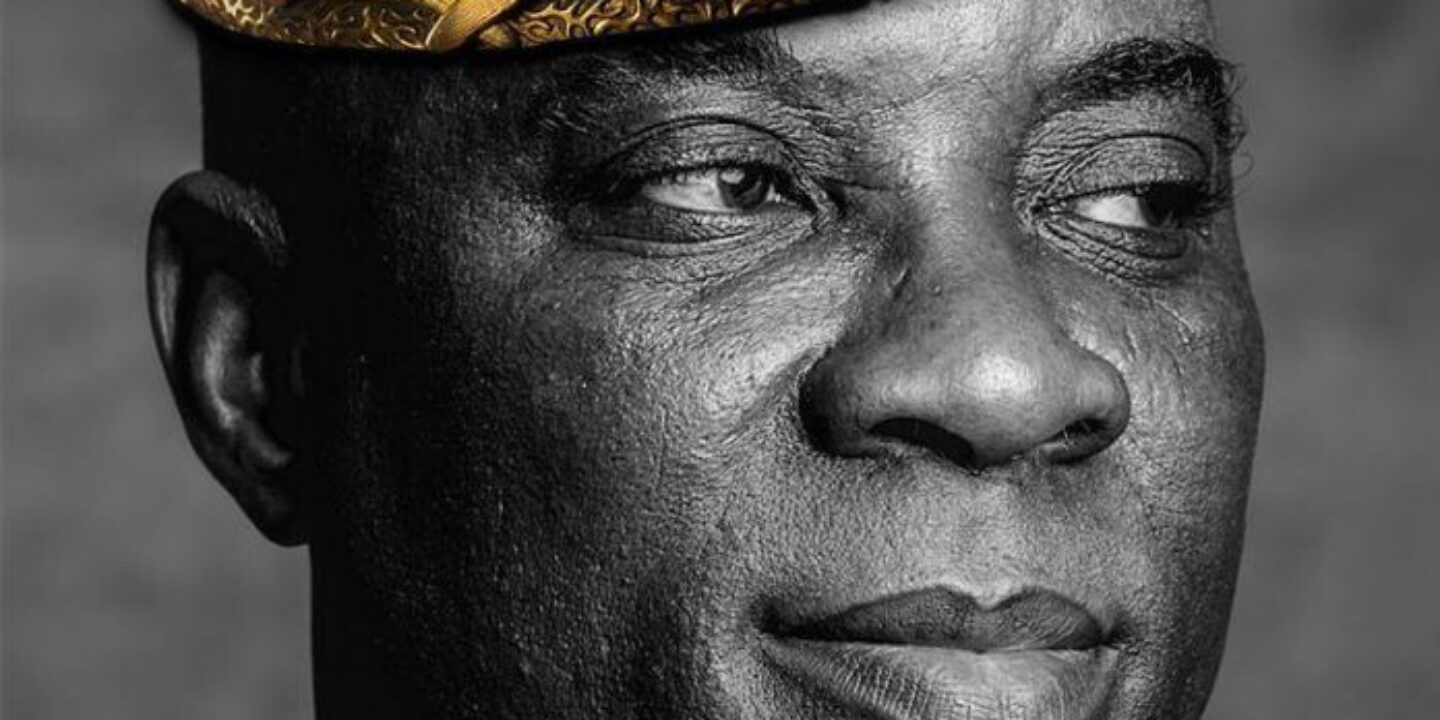In the sprawling sonic landscape of Afrobeats, where beats pulse across dance floors worldwide and Nigerian artists dominate international charts, an invisible thread connects every hit to a singular source. That thread often leads back to one man: King Wasiu Ayinde Marshal, known to the world as K1 De Ultimate. Positioned as the King of Fuji, many consider him, alongside other great names, as the architect of modern Nigerian music’s DNA.
The Genesis of a Musical RevolutionThe story begins in 1957, in the bustling neighbourhood of Agarawu, Lagos State, where a child named Wasiu Omogbolahan Olasunkanmi Adewale Ayinde Marshal drew his first breath. Born into a world where Yoruba oral traditions flowed like rivers through daily life, young Wasiu was immersed in the rhythmic conversations of talking drums, the melodic storytelling of griots, and the spiritual chants that punctuated communal gatherings.
But it was in the 1970s, under the tutelage of Ayinde Barrister, the visionary creator of Fuji music, that Wasiu’s destiny crystallized. As a member of the Supreme Fuji Commanders, he absorbed the technical aspects of music-making and the profound responsibility of being a cultural custodian. Fuji, born from the fusion of traditional Yoruba percussion with Islamic elements, was more than entertainment, it was identity, history, and spiritual expression wrapped in rhythm.
By 1980, with the release of his debut album Iba, Wasiu had begun to chart his own course. But it was Talazo ’84 that announced the arrival of a revolutionary force. This wasn’t just another Fuji album; it was a manifesto of musical evolution. K1 De Ultimate had taken the grassroots genre and electrified it, literally and figuratively, creating what would become known as Talazo Fuji.
The Alchemist of SoundWhat K1 De Ultimate accomplished in the 1980s was nothing short of musical alchemy. Traditional Fuji, with its roots in street performances and religious celebrations, was primarily acoustic and community-based. K1 De Ultimate saw beyond these boundaries. He envisioned Fuji as a global language, capable of speaking to a larger audience while maintaining its cultural authenticity.
His innovation was methodical yet inspired. Electric guitars began conversing with talking drums. Saxophones wove melodies around traditional Yoruba chants. Keyboards provided harmonic foundations for percussion patterns that had existed for centuries. It wasn’t cultural appropriation or abandonment, it was evolution. K1 De Ultimate understood that for Fuji to survive and thrive, it had to grow without losing its soul.
The impact was immediate and profound. Fuji concerts became theatrical experiences, with K1 De Ultimate’s commanding stage presence and his band’s electrifying performances drawing crowds that transcended traditional ethnic and class boundaries. Young urbanites who might have dismissed traditional music found themselves captivated by this modernized yet respectful interpretation of their cultural heritage.
The Living ArchiveK1 De Ultimate’s prolificacy defies comprehension. With over 200 studio and live albums to his name, he has created a library that chronicles an amazing artistic journey and the evolution of Nigerian society itself. His songs serve as historical documents, capturing political moments, social movements, and cultural shifts with the precision of a historian and the soul of a poet.
Each album tells stories of love and loss, triumph and struggle, tradition and change. His lyrics, primarily in Yoruba, paint vivid pictures of Nigerian life while his melodies create emotional moments that transcend language barriers. This is why his music translates so seamlessly across cultures, why international audiences can feel the power of his expression even without understanding every word.
The pinnacle of his archival mission came on December 9, 2024, when K1 De Ultimate achieved what no Nigerian artist, perhaps no artist anywhere, had ever attempted: the release of 100 live albums in a single day. This wasn’t a publicity stunt or a collection of rehearsal recordings. Each album represented a fully realized artistic statement, a complete experience. K1 De Ultimate declared that Fuji, and by extension Yoruba culture, is inexhaustible, a living tradition capable of infinite expression.
The DNA of AfrobeatsTo understand K1 De Ultimate’s influence on contemporary Nigerian music, one must recognize that Afrobeats didn’t emerge in a vacuum. The genre that now dominates global music charts carries within it the genetic code of its predecessors: Afrobeat, Highlife, Juju, Apala, and crucially, Fuji. K1 De Ultimate’s modernization of Fuji in the 1980s and 1990s created a template that Afrobeats artists would later adopt and adapt.
What are the call-and-response patterns that make Afrobeats so engaging? They echo the interactive nature of K1 De Ultimate’s performances. The percussion-heavy arrangements that give Afrobeats its infectious energy? They’re rooted in the Fuji rhythms K1 De Ultimate helped popularize. The seamless blend of traditional and modern elements that defines contemporary Nigerian pop? K1 De Ultimate pioneered this approach decades ago.
When Burna Boy speaks of being “African Giant,” when Wizkid croons about his roots, when Davido celebrates Nigerian culture, they’re walking paths that K1 De Ultimate blazed. His influence was more than just musical; it’s philosophical to a large extent. He demonstrated that Nigerian artists could honour their heritage while conquering global stages, that traditional didn’t mean outdated, that local could be universal.
The Most Sampled Voice in Nigerian MusicIn the digital age, artistic influence is measured not just in inspiration but in direct usage, which is sampling, interpolation, and reimagining. By this metric, K1 De Ultimate De Ultimate stands as one of Nigeria’s most influential artists. His catalogue has become a treasure trove for Afrobeats producers and artists seeking to connect with their roots while creating hits.
The sampling of K1 De Ultimate’s work is a cultural transmission. When Olamide opens “Anifowose” with elements from K1 De Ultimate’s “Omo Anifowose,” he’s not just creating a catchy hook; he’s bridging generational gaps, introducing younger audiences to Fuji’s rich tradition while adding his own contemporary twist. The result is music that feels nostalgic and futuristic.
Davido’s use of “Agogo Ko Ma Ro” in “Like Dat” demonstrates K1 De Ultimate’s cross-generational appeal. Davido, one of Afrobeats’ biggest stars, could sample any artist from anywhere in the world. His choice to reach into K1 De Ultimate’s catalogue speaks to the enduring power and relevance of Fuji’s King. Similarly, when Wizkid incorporated elements from “K1 De Ultimate For Wizkid Vol. 2 (Live)” into “Troubled Mind,” he acknowledged K1 De Ultimate as an influence and a creative partner across time.
Asake’s sampling of K1 De Ultimate’s work, “Won Tun Nna”, in tracks like “C’mon Look” represents the newest wave of this cultural recycling. Asake’s neo-Fuji approach to Afrobeats is perhaps the most direct descendant of K1 De Ultimate’s innovations, proving that the King’s influence continues to evolve and inspire new forms of expression. Also, K1 De Ultimate’s “Awa Tunde Batinde” featured in Reminisce’s song titled “The Ultimate”, featuring Vector and his song “Funky Fuji” featured in Bhadboi OML’s song titled “Wasiu Ayinde”
Beyond the Samples: Cultural ArchitectureK1 De Ultimate’s influence extends beyond direct sampling into the very structure of how contemporary Nigerian artists approach their craft. His mastery of audience engagement, his ability to weave social commentary into danceable music, and his skill at balancing tradition with innovation are lessons that appear throughout the Afrobeats business.
Consider how artists like Burna Boy incorporate social consciousness into their music, how they use their platforms to address political and cultural issues. This approach echoes K1 De Ultimate’s long-standing practice of using his music as a vehicle for commentary on Nigerian society. His songs have addressed everything from political corruption to social inequality, always wrapped in melodies that make the medicine go down easy.
The theatrical nature of modern Afrobeats performances, with their elaborate staging and audience participation, also bears K1 De Ultimate’s fingerprints. He transformed Fuji concerts from simple musical presentations into communal experiences, where the boundary between performer and audience dissolved. This approach now defines the Afrobeats concert experience, from intimate club shows to massive festival stages.
The Sync RevolutionK1 De Ultimate’s reach extends into visual media, where his music has found new life in Nollywood productions. The use of “Consolidation” and “Nigeria the New Era Pt. 2” in “Everybody Loves Jenifa,” and “Show Color” and “Won Tun Nna” in “Red Circle,” and “Gang of Lagos” demonstrates the cinematic quality of his compositions. These placements introduce K1 De Ultimate’s music to audiences who might not actively seek out Fuji, expanding his influence through the powerful medium of film.
This crossover appeal highlights one of K1 De Ultimate’s greatest achievements: creating music that is simultaneously deeply rooted in Yoruba culture and universally accessible. His compositions work equally well as background music for dramatic scenes and as foreground entertainment in concert halls, proving their versatility and enduring relevance.
The Cultural InstitutionK1 De Ultimate’s significance transcends music, positioning him as a cultural institution in the truest sense. His numerous chieftaincy titles, Mayegun of Yorubaland, Olori Omo Oba Akile Ijebu, Balogun of Ilupeju Ekiti, Badabarawu of Ogijo, Ekerin Amuludun of Ibadanland, recognize more than his musical achievements; they recognize his role as a cultural custodian. These honours acknowledge his responsibility to preserve and promote Yoruba traditions while ensuring their continued evolution.
His mentorship of younger artists, both within Fuji and across genres, has created a network of influence that extends throughout Nigerian music. Artists who might never be directly associated with Fuji carry lessons learned from K1 De Ultimate’s approach to creativity, performance, and cultural responsibility. This invisible influence may be his most important legacy, the way he’s shaped what many Nigerian artists create and how they think about their role as cultural ambassadors.
The Global ResonanceK1 De Ultimate’s international performances have carried Fuji to stages across Europe, North America, and Asia, introducing global audiences to the sophisticated rhythms and rich traditions of Yoruba music. These performances have broken down cultural barriers, proving that authenticity and artistry can communicate across language and cultural divides.
His influence on the global African music scene extends beyond his own performances. As Afrobeats has gained international recognition, the Fuji elements within it, largely traceable to K1 De Ultimate’s innovations, have introduced global audiences to traditional Nigerian music forms. Every time an Afrobeats song with Fuji influences plays on international radio or streams on global platforms, K1 De Ultimate’s cultural DNA travels with it.
The Living BridgeWhat makes K1 De Ultimate truly remarkable is his role as a living bridge between Nigeria’s musical past and its future. He has managed to honour traditional forms while pioneering innovations, to maintain cultural authenticity while embracing global influences, to respect his elders while mentoring the next generation.
His story is one of evolution without abandonment, innovation without disrespect, and growth without loss of identity. In an era where globalization often threatens local cultures, K1 De Ultimate has demonstrated that the answer isn’t resistance but intelligent adaptation, taking the best of traditional forms and allowing them to grow into new expressions.
The Eternal InfluenceAs we examine the landscape of contemporary Nigerian music, K1 De Ultimate’s influence becomes increasingly clear. He isn’t just sampled because his music sounds good, though it certainly does. He’s sampled because his work represents something essential about Nigerian identity, something that younger artists instinctively recognize and want to connect with.
His rhythms carry the heartbeat of Nigeria. His melodies echo the soul of Yoruba culture. His innovations point the way forward while his traditions anchor the present to the past. In sampling K1 De Ultimate, Afrobeats artists are tapping into a cultural wellspring that connects them to their heritage and their identity.
The Undisputed LegacyToday, as K1 De Ultimate De Ultimate continues to tour, record, and influence, his legacy is already secure. He has transformed a traditional genre into a global language, created a catalogue that serves as both cultural archive and creative inspiration, and influenced generations of artists who carry his innovations forward.
Speaking on the legacy of K1 De Ultimate, Ezekiel Olayinka, the General Manager of Digital Music Commerce And Exchange Limited, who is the rights and catalog manager of K1 De Ultimate, has this to say;
“We see ourselves as more than just catalog managers for K1 De Ultimate; we are the custodians of a national treasure. Our primary role is to preserve and amplify the monumental legacy contained within his over 200 albums, ensuring this cultural archive connects with new generations in the digital age. Recognizing the profound, foundational influence of his work on the Afrobeats genre that the world celebrates today, it was our strategic imperative to connect this legacy with a global partner. We were instrumental in structuring the landmark deal with Sony Music Publishing Nigeria by illustrating that K1 De Ultimate’s catalogue isn’t just history; it’s a living, breathing source of commercial and creative value, proven by its constant sampling by today’s biggest stars. Working with K1 De Ultimate is a masterclass in artistic evolution and cultural preservation. He is a living bridge between generations, an architect who laid the sonic and philosophical groundwork for modern Nigerian music, and our mission is to ensure his eternal influence continues to resonate globally.”
The numbers tell part of the story, over 200 albums, countless awards, international recognition, and unprecedented achievements like his 100-album single-day release. But the real measure of his influence lies in the music being made today, in the voices of artists who learned from his example, in the samples that keep his work alive for new generations.
From Olamide’s street anthems to Davido’s hits, from Asake’s neo-Fuji explorations to the next wave of artists just beginning to emerge, K1 De Ultimate’s influence flows like a river through the landscape of Nigerian music. He is the undisputed King of Fuji, the King of Legacy, the architect of continuity, the bridge between what was and what will be.
In the end, K1 De Ultimate’s greatest achievement may be this: he ensured that as Nigerian music conquered the world, it never forgot where it came from. Every Afrobeats hit that samples his work, every artist who acknowledges his influence, every young musician who learns to balance tradition with innovation, they are all part of K1 De Ultimate’s continuing story.
The King of Fuji has become something more, a permanent fixture in the DNA of Nigerian music, an eternal influence whose voice will echo through generations yet to come. When the world dances to Afrobeats, they dance to his rhythm. When Nigeria’s musical children sing their songs of tomorrow, they sing with his voice.
K1 De Ultimate De Ultimate: The man who made sure that Nigeria’s musical future would always remember its past, and that its past would always inspire its future.












